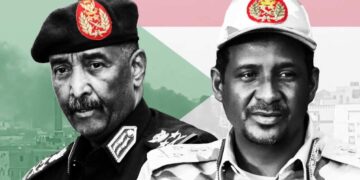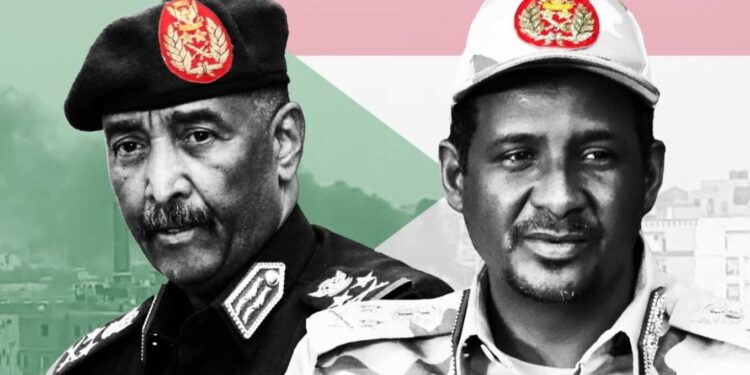By John Ikani
New peace discussions aimed at resolving Sudan’s 16-month conflict have commenced, even though both sides involved in the fighting have not joined the negotiations.
The US, leading the talks, emphasized that the event would proceed regardless, stating, “We are going to try to do everything we can to try to end this horrific crisis in Sudan”.
Clashes between the army and the paramilitary Rapid Support Forces (RSF) have resulted in thousands of deaths, displaced roughly 10 million people, and triggered what the United Nations has labelled the “world’s worst hunger crisis”.
The army announced its intention to boycott the talks a few days ago, while RSF representatives travelled to Switzerland but decided not to participate at the last minute.
Shattering hopes for a ceasefire, the army explained its absence by claiming the RSF hadn’t followed through on “what was agreed upon” in Saudi Arabia the previous year.
The army stated that the paramilitary group hadn’t fulfilled key conditions of the Jeddah Declaration, such as removing its fighters from civilian homes and public buildings.
“Military operations will not stop without the withdrawal of every last militiaman from the cities and villages they have plundered and colonised,” said Sudanese armed forces chief Abdel Fattah al-Burhan.
The RSF has refuted allegations of looting and violence against civilians.
As recently as Tuesday night, there was still optimism that Sudan’s army would attend the talks. Tom Perriello, the US Special Envoy for Sudan, mentioned at 23:30 GMT (00:30 Swiss time) that the delegates were “still waiting on the SAF”.
“The world is watching,” he posted on X.
Mr Perriello informed the BBC that in the absence of both sides, the other parties were “moving forward with the negotiations on everything we can do, to make sure we are getting food and medicine and civilian protection to every person in Sudan”.
The RSF indicated on Tuesday night that their presence in Geneva was “a powerful testament to our resolve and determination to alleviate the suffering of the Sudanese people”. The group urged the army to join the talks.
However, the RSF were not present at the start of the talks on Wednesday. The group has not publicly explained their withdrawal.
Before the talks were scheduled to begin, and prior to the RSF’s withdrawal, Mukesh Kapila, the former United Nations Chief Coordinator for Sudan, described the atmosphere among the delegates as “pretty glum”.
“I don’t think the two belligerents are interested in talking to each other. One of them is not here already and not much is expected,” he told the BBC.
Mr Perriello, on the other hand, expressed his “very, very hopeful” outlook that the army would heed “the overwhelming voice of the Sudanese people” and send representatives to Geneva for the discussions.
Past peace talks in Saudi Arabia and Bahrain have all been unsuccessful.
Delegates from the US, United Arab Emirates (UAE), Saudi Arabia, Egypt, the African Union and the United Nations were present at Wednesday’s ceremony.
In addition to referencing the Jeddah Declaration, the army also voiced its opposition to the UAE’s presence as an observer.
The UAE has been accused of supplying weapons to the RSF, although the Gulf nation has denied any involvement.
The US stated that the UAE and Egypt – both believed to have influence in the conflict – needed to be present at the talks to help ensure any ceasefire is actually maintained.
According to the UN’s migration agency, tens of thousands of preventable deaths are imminent in Sudan if the conflict and restrictions on humanitarian aid persist.
As talks commenced in Geneva, medical charity MSF reported that the last operational hospital in the besieged Sudanese city of el-Fasher might have to close due to intense bombardment.
The surgical ward in the Saudi hospital was hit on Sunday, resulting in the death of a patient’s caregiver and injuries to five others, the charity reported.
The Rapid Support Forces have been attempting to seize the city from the army for several months, forcing tens of thousands of civilians to flee.
It is the last city still under army control in the western region of Darfur, where the RSF has been accused of widespread atrocities against the region’s non-Arabic population.




































